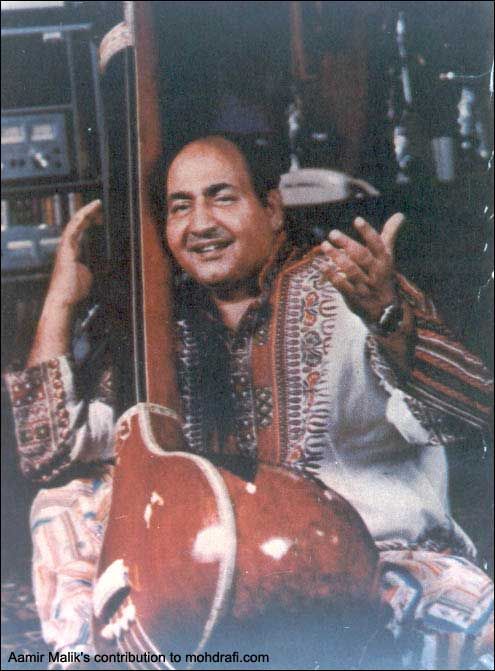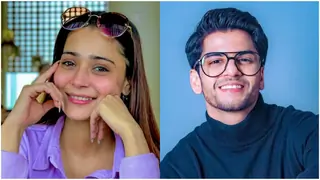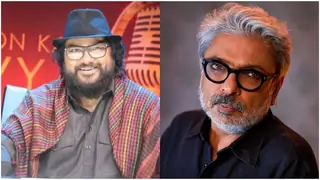This article is by Mr. Anmol Singh.
The world is a difficult place to live with hypocritical attitudes, materialistic people, hatred, etc. Saints belonging to any culture and belief are indeed above all this. Saints are individuals of a very extra ordinary destiny send by the Almighty to this world to convey the message of peace and love and to balance hatred and materialistic attitudes among the mankind. Saints do exist in all walks of life. It's not the just an individual who wears a specific dress code is a saint. Saints do exist among us as common men. The perception of saint changes from time to time based on our way of life. Rafi Saab is one such unique personality who can be considered the saint in modern times.
Most Music Composers in the 1950s & 60s like Usha Khanna, R D Burman & LP started their career with Rafi Saab. Possibly most filmmakers always insisted them to use Rafi Saab. It is applicable the other way round also when Music Composers where given liberty of choosing singers majority always opted for Rafi Saab. There are a couple of reasons to these criteria; firstly Rafi Saab is approachable to any music composer irrespective of their market value. Secondly by using Rafi Saab for their initial assignments guarantees negligible rate of failure. In our daily life we do set priorities and do all sorts of materialistic things to achieve our career goals. But saints do not believe in such theories, they do serve people unconditionally. Perhaps the same can be said about Rafi Saab as well. Usha Khanna used Rafi Saab in her first assignment for all the songs in "Dil Deke Dekho". The same holds true for R D Burman in "Chotte Nawab" and LP in "Parasmani". The most astonishing fact is they do not use any other male singer apart from Rafi Saab for all the songs. Perhaps one wrong move would result in end of the road. Later on many success full music composers may have diversified with time and developed their own set of singers, but again when it came to master performance there was none other then Rafi Saab to render. The best example could be R D Burman's unforgettable score in "Hum Kissi Kam Nahi". Similar criteria holds true for Dada Burman also for his compositions in "Guide", where he expresses totally fulfillment for his work through Rafi Saab's performance. There are many such examples.
Coming to actors again Rafi Saab plays a important role. Shammi Kapoor was a failure initially termed by the media "Shammi Apes Raj". When Shammi Kapoor comes in a different style in "Tum Sa Nahin Dekha", Rafi plays a vital role here and gives credit to others stating "Unke Vajye Se Mujhe Kaam Milaa". We as individuals blow up to any extent to highlight our own achievements. But Saints are very modest by nature and do not believe in praising them selves. With Rafi, Shammi Kapoor had a second chance to make a come back. There is another example from the film "Unche Log" where Feroz Khan gets a face lift through the song "Jaag Dile Diwaana". This holds true from many other actors as well. Without Rafi a second chance is difficult, because many singers are particular on picturization of their songs in the films. Therefore Rafi Saab is indeed the best bet for any new comer. Manoj Kumar has been a thorough Mahendra Kapoor and Mukesh supporter in many of the films produced by him. But when it came to his first film "Shaheed" as a Producer & Director, it is Rafi because again the probability of failure is negligible. This film helped Manoj Kumar in building his patriotic "Bharat" image on screen. There after he never used Rafi Saab for a decade or so, but came back to Rafi Saab to render songs for his film "Shirdi Wale Sai Baba" and "Kranti". The same theory is applicable for other actor turned producers like Rakesh Roshan in "Aap Ke Diwane" and Subash Ghai for "Kalicharan". Both producers as newcomers don't take risk by avoiding use of Rafi Saab as one of the main lead singers.
Human relationships are very complex to maintained and handle. Going ahead with the above theory many music composers or filmmakers got established using Rafi Saab initially but parted ways there after. Later on came to Rafi Saab when they experienced downfall to make another come back. As human beings we tend to take undue advantage of such situations or thinking of our own benefit first or helping by putting conditions; etc. But again saints are always above all such complexities. So is Rafi Saab as well. When R D Burman came back to Rafi in the late 70 Rafi Saab was very much same as he was during the success of "Teesri Manzil" in the late 60s. Early 70s being a tough phase of Rafi Saab; still could provide many hits without working under many big banners. This is another saintly quality of Rafi Saab. Saints do not complain or blame others for their setbacks. They mold & adjust themselves with the changing scenarios and make way for themselves accordingly. No wonder Rafi Saab made a grant come back in the mid 70s proving the music world that he is the voice of all times.
In this world we all have our own set of goals. In the journey of success we don't really bother whether our master (employer) or contemporaries need our support in tough times of changing scenarios of business. We change our employers & friend circles as for our own materialistic gains. When the same employers & friends ditch us we want the entire world to be at our sympathy. Yes we, as human beings are all very selfish. But saints are not affected by greed or glamour. So is Rafi Saab, whether a filmmaker is in a sound financial position or not he always provided 'A' grade performance without being concerned about the out come till his last breath. The same can be said for the dispute on royalty issue. Only saints feel the pain of others. No wonder Rafi Saab sided with the filmmakers. In return of gratitude all filmmakers and music composers in mid 60s sided with Rafi Saab and managed all the hit duets without any use of Lata Mangeshkar.
During the lean phase in the early 70s with exception of Chetan Anand and Nasir Hussian banner Rafi Saab sang for mostly small time filmmakers and music composers. Despite the media writing about his setback Rafi Saab did not try to maintain a false pride or try seeking a false publicity, which most actors do during their tough face. Again Saints have the ability to accept the reality of life, they live happy under all circumstances and think of the good of every one. So did Rafi Saab, he never made any statement against any of his contemporaries during his lean years.
India is the land from where many saints like Ram, Kabir, Gautam Buddha, Mahavir, Guru Nanak, etc originated. Later on their followers influenced many religions, which have spread across the globe. Of course it would be incorrect to place Rafi Saab among such great souls. Rafi Saab doesn't influence a religion but certainly brings together large number of fans that are humble and kind hearted by nature. In other words if one seeks to have a good company of individuals or friends the secret lies in becoming a Rafi Fan. Above all India is lucky to have a singer like Rafi Saab; on the contrary Rafi Saab could have never prospered in any other country. Therefore Rafi Saab and India are made for each other. This has been very well highlighted by Naushad Saab in one of the programs on the Doordarshan, "Hindustan Ki Atma Amar Hai, Hindustan Ka Sangeet Amar Hai". India's soul is immortal; India's music is immortal.
Saints are great students always ready to learn some thing new. Saints do not criticize or hurt any individual's self esteem however small one would be. So is Rafi Saab. If a music composer is a new comer, Rafi Saab was always a student for them. Classic examples are Shanker Jaikisan for the song from Barsaat, "Mai Zindage Mein Har Dam Rota Hi Raha Hun", were Rafi Saab tells to the duo, 'you are the composers I will sing the song the way you want'. This was SJ's first encounter with Rafi Saab, their partnership created history in the music world for next two decades. Another example is Usha Khanna for the recording of the song for the film "Dil Deke Dekho", were Usha was hesitant to suggest some thing to an established singer like Rafi Saab. But Rafi Saab read Usha mind and told her, 'Usha tumne humse gana nahi sikhna, humne tumse ganaa sikhna hai'. The same would hold true for new singers also. There are many such examples with many new music composers.
Despite being modest and kind saints face of lot of criticism. There is a saying the tree which bears most fruits receives maximum stones. It can be said for Rafi Saab also. During his entire career span Rafi Saab also indeed went through a lot of pain meeting every possible requirement to perfection. If one goes back to history majority saints whether Jesus Christ or Sant Kabir or a Saint from any religion went through a lot of pain & criticism. But despite all this Saints still think well of people who hate them. A classic example would be the rift with music composer O P Nayyar. Perhaps it would be considered being too harsh on part of O P Nayyar to part ways with Rafi Saab for reporting late once for a recording considering their long association. But finally it was Rafi Saab who initiated the patch up with O P Nayyar. Only saints have such a heart to digest hatred and step down for the good.
India is a land of various cultures and diversities. Rafi Saab is the voice of all cultures singing in all types of songs 12 different languages. Indeed saints serve people of all cultures irrespective of their caste or creed. So did Rafi Saab, by bringing all cultures together through a single voice and under one roof. Rafi Saab being a devoted Muslim, whether he sings a Bhajan or a devotional song or a Gurbani or a song for Durga Puja or English devotional or any other language it provides the same piece of mind and satisfaction.
Despite all the achievements the Indian media is always negative compared to other countries. One can understand what state of mind Rafi Saab must have gone through in the 70s with such a negative media. President APJ Abdul Kalam in one of his speeches has stated, "Why is the media here so negative? Why are we in India so embarrassed to recognize our own strengths, our achievements? We are such a great nation. We have so many amazing success stories but we refuse to acknowledge them. Why? We are the second largest producer of wheat in the world. We are the second largest producers in rice. We are the first in milk production. We are number one in Remote sensing satellites. Look at Dr. Sudarshan, he has transferred the tribal village into a self-sustaining, self-driving unit. There are millions of such achievements but our media is only obsessed with the bad news and failures and disasters." The entire speech can be read through the following link. http://ckunte.com/archives/2002/06/19/dr-apj-abdul-kalam. Therefore one should not be surprised in a country like India if Rafi Saab's ability is under estimated. But such type of ignorance does not affect saints like Rafi Saab. The greatest award is that Rafi Saab is remembered and recognized by his fans till date across the globe and will continue to be so for many years to come.
We all have to leave this world one fine day, but Rafi Saab's untimely premature dismissal was indeed a very Sad Day and a great loss for the film industry; India as a country and the entire audience which appreciated quality work. Rafi Saabs death brings an end to many filmmakers like Man Mohan Desai, Chetan Anand, J Om Prakash, Nasir Hussian, etc who enjoyed success through his songs in the 60s and 70s. Music composers most affected were LP who never won a film fare award after 1980 because they had lost their 'Parasmani' called Mohd. Rafi forever who converted their each and every piece of composition into Gold. But despite the falling standards of melody LP maintained their position till the mid 90s. Perhaps R D Burman was not as lucky as LP. R D Burman did enjoy some success in the early 80s but could not repeat the magic of 70s with Kishore and Gulzar again. By mid & late 80s he reached the dead end. RDB indeed tried hard to make a come back. Possibly if Rafi Saab could have lived may be RDB could have made a come back explored his untapped potential. Without Rafi Saab many quality music composers, lyricist, filmmakers faded forever. Many small time composers like Sapan Jagmohan, Shamji Ghanshamji, Soni Omi, Ganesh, etc who enjoyed success in the 70s through Rafi Saab never revived again after his dismissal. Music indeed witnessed the worst phase during mid eighties. During Rafi Saab's death as stated by lyrist Majrooh Sultanpuri that it would be difficult to compose songs since Rafi Saab simplified singing to a great extend. In other words Rafi Saab could sing any type of song.
26 years have passed like a few seconds; the world around us has changed. But the divine aura, which Rafi Saab generates even today, is very much the same. New souls come to this world every day. They are influenced by his divine aura and become a Rafian. Yes indeed Rafi Saab is the Saint in Modern Times.
http://www.youtube.com/watch?v=JlK4hBZz3Zs&mode=related&sear ch=






























